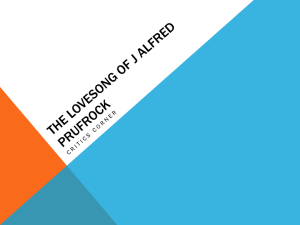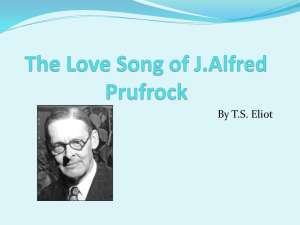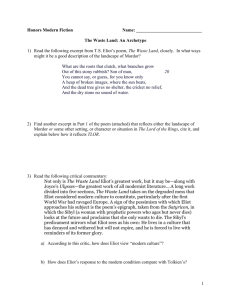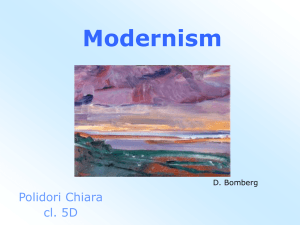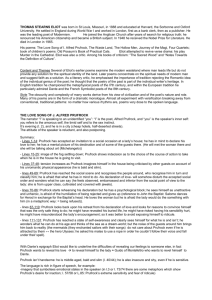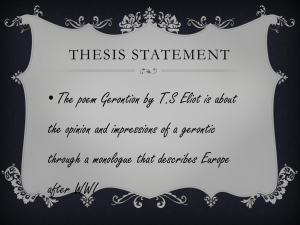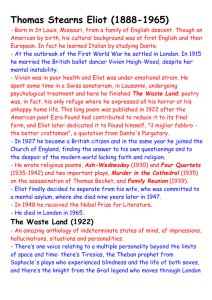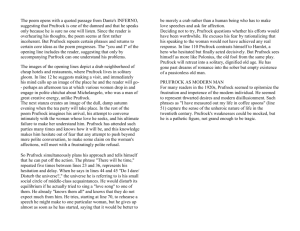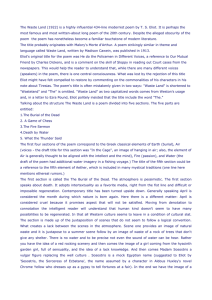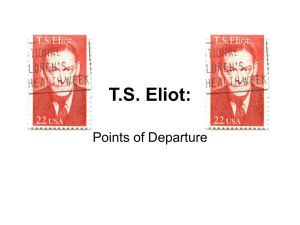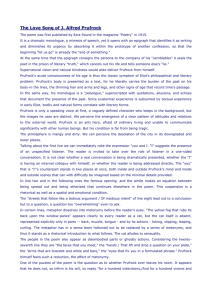The Love Song of J Alfred Prufrock
advertisement
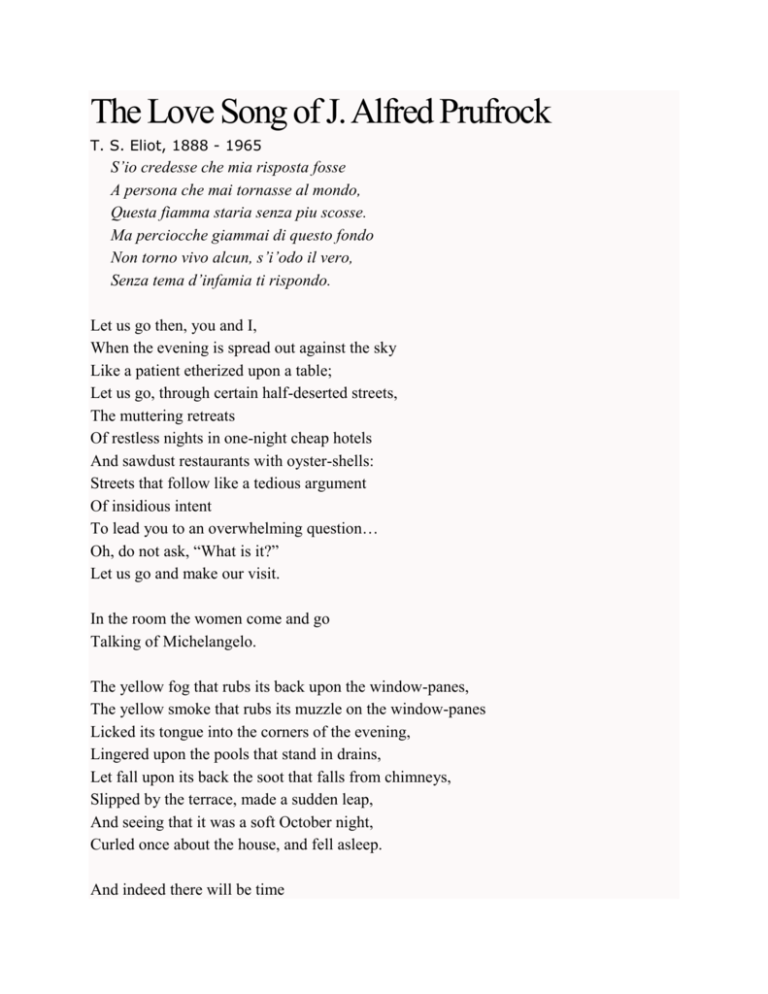
The Love Song of J. Alfred Prufrock T. S. Eliot, 1888 - 1965 S’io credesse che mia risposta fosse A persona che mai tornasse al mondo, Questa fiamma staria senza piu scosse. Ma perciocche giammai di questo fondo Non torno vivo alcun, s’i’odo il vero, Senza tema d’infamia ti rispondo. Let us go then, you and I, When the evening is spread out against the sky Like a patient etherized upon a table; Let us go, through certain half-deserted streets, The muttering retreats Of restless nights in one-night cheap hotels And sawdust restaurants with oyster-shells: Streets that follow like a tedious argument Of insidious intent To lead you to an overwhelming question… Oh, do not ask, “What is it?” Let us go and make our visit. In the room the women come and go Talking of Michelangelo. The yellow fog that rubs its back upon the window-panes, The yellow smoke that rubs its muzzle on the window-panes Licked its tongue into the corners of the evening, Lingered upon the pools that stand in drains, Let fall upon its back the soot that falls from chimneys, Slipped by the terrace, made a sudden leap, And seeing that it was a soft October night, Curled once about the house, and fell asleep. And indeed there will be time For the yellow smoke that slides along the street, Rubbing its back upon the window-panes; There will be time, there will be time To prepare a face to meet the faces that you meet; There will be time to murder and create, And time for all the works and days of hands That lift and drop a question on your plate; Time for you and time for me, And time yet for a hundred indecisions, And for a hundred visions and revisions, Before the taking of a toast and tea. In the room the women come and go Talking of Michelangelo. And indeed there will be time To wonder, “Do I dare?” and, “Do I dare?” Time to turn back and descend the stair, With a bald spot in the middle of my hair— [They will say: “How his hair is growing thin!”] My morning coat, my collar mounting firmly to the chin, My necktie rich and modest, but asserted by a simple pin— [They will say: “But how his arms and legs are thin!”] Do I dare Disturb the universe? In a minute there is time For decisions and revisions which a minute will reverse. For I have known them all already, known them all— Have known the evenings, mornings, afternoons, I have measured out my life with coffee spoons; I know the voices dying with a dying fall Beneath the music from a farther room. So how should I presume? And I have known the eyes already, known them all— The eyes that fix you in a formulated phrase, And when I am formulated, sprawling on a pin, When I am pinned and wriggling on the wall, Then how should I begin To spit out all the butt-ends of my days and ways? And how should I presume? And I have known the arms already, known them all— Arms that are braceleted and white and bare [But in the lamplight, downed with light brown hair!] Is it perfume from a dress That makes me so digress? Arms that lie along a table, or wrap about a shawl. And should I then presume? And how should I begin? ..... Shall I say, I have gone at dusk through narrow streets And watched the smoke that rises from the pipes Of lonely men in shirt-sleeves, leaning out of windows? … I should have been a pair of ragged claws Scuttling across the floors of silent seas. ..... And the afternoon, the evening, sleeps so peacefully! Smoothed by long fingers, Asleep… tired… or it malingers, Stretched on the floor, here beside you and me. Should I, after tea and cakes and ices, Have the strength to force the moment to its crisis? But though I have wept and fasted, wept and prayed, Though I have seen my head [grown slightly bald] brought in upon a platter, I am no prophet—and here’s no great matter; I have seen the moment of my greatness flicker, And I have seen the eternal Footman hold my coat, and snicker, And in short, I was afraid. And would it have been worth it, after all, After the cups, the marmalade, the tea, Among the porcelain, among some talk of you and me, Would it have been worth while, To have bitten off the matter with a smile, To have squeezed the universe into a ball To roll it toward some overwhelming question, To say: “I am Lazarus, come from the dead, Come back to tell you all, I shall tell you all”— If one, settling a pillow by her head, Should say: “That is not what I meant at all. That is not it, at all.” And would it have been worth it, after all, Would it have been worth while, After the sunsets and the dooryards and the sprinkled streets, After the novels, after the teacups, after the skirts that trail along the floor— And this, and so much more?— It is impossible to say just what I mean! But as if a magic lantern threw the nerves in patterns on a screen: Would it have been worth while If one, settling a pillow or throwing off a shawl, And turning toward the window, should say: “That is not it at all, That is not what I meant, at all.” ..... No! I am not Prince Hamlet, nor was meant to be; Am an attendant lord, one that will do To swell a progress, start a scene or two, Advise the prince; no doubt, an easy tool, Deferential, glad to be of use, Politic, cautious, and meticulous; Full of high sentence, but a bit obtuse; At times, indeed, almost ridiculous— Almost, at times, the Fool. I grow old… I grow old… I shall wear the bottoms of my trousers rolled. Shall I part my hair behind? Do I dare to eat a peach? I shall wear white flannel trousers, and walk upon the beach. I have heard the mermaids singing, each to each. I do not think that they will sing to me. I have seen them riding seaward on the waves Combing the white hair of the waves blown back When the wind blows the water white and black. We have lingered in the chambers of the sea By sea-girls wreathed with seaweed red and brown Till human voices wake us, and we drown. (1910 – 1911) ANALYSIS Summary This poem, the earliest of Eliot’s major works, was completed in 1 9 1 0 or 1 9 1 1 but not published until 1 9 1 5 . It is an examination of the tortured psyche of the prototypical modern man— overeducated, eloquent, neurotic, and emotionally stilted. Prufrock, the poem’s speaker, seems to be addressing a potential lover, with whom he would like to “force the moment to its crisis” by somehow consummating their relationship. But Prufrock knows too much of life to “dare” an approach to the woman: In his mind he hears the comments others make about his inadequacies, and he chides himself for “presuming” emotional interaction could be possible at all. The poem moves from a series of fairly concrete (for Eliot) physical settings—a cityscape (the famous “patient etherised upon a table”) and several interiors (women’s arms in the lamplight, coffee spoons, fireplaces)—to a series of vague ocean images conveying Prufrock’s emotional distance from the world as he comes to recognize his second-rate status (“I am not Prince Hamlet’). “Prufrock” is powerful for its range of intellectual reference and also for the vividness of character achieved. Form “Prufrock” is a variation on the dramatic monologue, a type of poem popular with Eliot’s predecessors. Dramatic monologues are similar to soliloquies in plays. Three things characterize the dramatic monologue, according to M.H. Abrams. First, they are the utterances of a specific individual (not the poet) at a specific moment in time. Secondly, the monologue is specifically directed at a listener or listeners whose presence is not directly referenced but is merely suggested in the speaker’s words. Third, the primary focus is the development and revelation of the speaker’s character. Eliot modernizes the form by removing the implied listeners and focusing on Prufrock’s interiority and isolation. The epigraph to this poem, from Dante’s Inferno, describes Prufrock’s ideal listener: one who is as lost as the speaker and will never betray to the world the content of Prufrock’s present confessions. In the world Prufrock describes, though, no such sympathetic figure exists, and he must, therefore, be content with silent reflection. In its focus on character and its dramatic sensibility, “Prufrock” anticipates Eliot’s later, dramatic works. The rhyme scheme of this poem is irregular but not random. While sections of the poem may resemble free verse, in reality, “Prufrock” is a carefully structured amalgamation of poetic forms. The bits and pieces of rhyme become much more apparent when the poem is read aloud. One of the most prominent formal characteristics of this work is the use of refrains. Prufrock’s continual return to the “women [who] come and go / Talking of Michelangelo” and his recurrent questionings (“how should I presume?”) and pessimistic appraisals (“That is not it, at all.”) both reference an earlier poetic tradition and help Eliot describe the consciousness of a modern, neurotic individual. Prufrock’s obsessiveness is aesthetic, but it is also a sign of compulsiveness and isolation. Another important formal feature is the use of fragments of sonnet form, particularly at the poem’s conclusion. The three three-line stanzas are rhymed as the conclusion of a Petrarchan sonnet would be, but their pessimistic, anti-romantic content, coupled with the despairing interjection, “I do not think they (the mermaids) would sing to me,” creates a contrast that comments bitterly on the bleakness of modernity. Commentary “Prufrock” displays the two most important characteristics of Eliot’s early poetry. First, it is strongly influenced by the French Symbolists, like Mallarmé, Rimbaud, and Baudelaire, whom Eliot had been reading almost constantly while writing the poem. From the Symbolists, Eliot takes his sensuous language and eye for unnerving or anti-aesthetic detail that nevertheless contributes to the overall beauty of the poem (the yellow smoke and the hair-covered arms of the women are two good examples of this). The Symbolists, too, privileged the same kind of individual Eliot creates with Prufrock: the moody, urban, isolated-yet-sensitive thinker. However, whereas the Symbolists would have been more likely to make their speaker himself a poet or artist, Eliot chooses to make Prufrock an unacknowledged poet, a sort of artist for the common man. The second defining characteristic of this poem is its use of fragmentation and juxtaposition. Eliot sustained his interest in fragmentation and its applications throughout his career, and his use of the technique changes in important ways across his body of work: Here, the subjects undergoing fragmentation (and reassembly) are mental focus and certain sets of imagery; in The Waste Land, it is modern culture that splinters; in the Four Quartets we find the fragments of attempted philosophical systems. Eliot’s use of bits and pieces of formal structure suggests that fragmentation, although anxiety-provoking, is nevertheless productive; had he chosen to write in free verse, the poem would have seemed much more nihilistic. The kinds of imagery Eliot uses also suggest that something new can be made from the ruins: The series of hypothetical encounters at the poem’s center are iterated and discontinuous but nevertheless lead to a sort of epiphany (albeit a dark one) rather than just leading nowhere. Eliot also introduces an image that will recur in his later poetry, that of the scavenger. Prufrock thinks that he “should have been a pair of ragged claws / Scuttling across the floors of silent seas.” Crabs are scavengers, garbage-eaters who live off refuse that makes its way to the sea floor. Eliot’s discussions of his own poetic technique (see especially his essay “Tradition and the Individual Talent”) suggest that making something beautiful out of the refuse of modern life, as a crab sustains and nourishes itself on garbage, may, in fact, be the highest form of art. At the very least, this notion subverts romantic ideals about art; at best, it suggests that fragments may become reintegrated, that art may be in some way therapeutic for a broken modern world. In The Waste Land, crabs become rats, and the optimism disappears, but here Eliot seems to assert only the limitless potential of scavenging. “Prufrock” ends with the hero assigning himself a role in one of Shakespeare’s plays: While he is no Hamlet, he may yet be useful and important as “an attendant lord, one that will do / To swell a progress, start a scene or two...” This implies that there is still a continuity between Shakespeare’s world and ours, that Hamlet is still relevant to us and that we are still part of a world that could produce something like Shakespeare’s plays. Implicit in this, of course, is the suggestion that Eliot, who has created an “attendant lord,” may now go on to create another Hamlet. While “Prufrock” ends with a devaluation of its hero, it exalts its creator. Or does it? The last line of the poem suggests otherwise—that when the world intrudes, when “human voices wake us,” the dream is shattered: “we drown.” With this single line, Eliot dismantles the romantic notion that poetic genius is all that is needed to triumph over the destructive, impersonal forces of the modern world. In reality, Eliot the poet is little better than his creation: He differs from Prufrock only by retaining a bit of hubris, which shows through from time to time. Eliot’s poetic creation, thus, mirrors Prufrock’s soliloquy: Both are an expression of aesthetic ability and sensitivity that seems to have no place in the modern world. This realistic, anti-romantic outlook sets the stage for Eliot’s later works, including The Waste Land.
